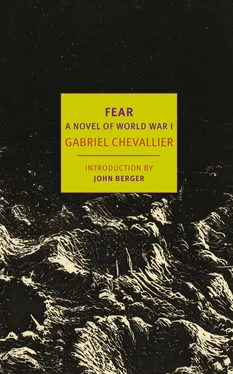Our huts were so infested with lice that I would often go and sleep in a field, rolled up in my blanket and tent canvas. The trouble with that was the damp morning dew. That was surely the cause of the stomach upsets that wore me out and for a long time gave me no peace at all. In a situation where everything depends on your body, a discomfort like this became something very serious.
Along with Bertrand and some other soldiers, I was attached to the company office as a runner or, if they needed one, a secretary. This did not spare us from work, but it brought a few advantages. We got out of afternoon drill and other petty annoyances, and we were given food separately which we could cook in kitchens in the village, paying the people who lived there a bit of extra money to improve on our rations. This cooking was also an occasion for frequent quarrels, because of the work it entailed, to which we brought very little good will. I often noticed at the front how men’s boredom and misery changed to anger at the slightest pretext; they did not know who to blame and so turned violently against each other. Too much suffering made them lose control. And since material concerns were all they thought about (all intellectual life being suspended, having nothing there to nourish it), the pettiest issues were the cause of their arguments. In war all instincts are given free rein, with nothing to impede or stop them, except for death’s arbitrary intervention. And even that limit did not exist for those whose jobs usually kept them out of danger. Among the many senior officers staying in the village I saw two examples.
The first was the colonel of an infantry regiment, idling away the time in a camp that had been set up on the outskirts of the village. A former colonial, red-faced and robust, he derived great pleasure from beating up soldiers. His way of doing this, as I witnessed, showed clearly that he was deranged. He would hail someone, call him over, and then, with a warm smile, ask him a few friendly questions to put him at ease — but his eyes shone in a strange way, and his veins swelled up. And then suddenly he would strike the subordinate a blow full in the face, accompanied by a torrent of insults, which made him even more excited: ‘Take that, you swine! You son of a bitch!’ He would carry on hitting the man until, having got over his surprise, his victim would flee. Then the colonel would resume his stroll, moving in a jerky, uncoordinated fashion like someone suffering from ataxia, smacking his jaws, with a contented air. It would often happen that a soldier walking along with nothing much to do would be stopped and get a fierce kick in the arse: the colonel had passed. Very soon, people learned to get well out of the way when they saw him coming, and he could no longer approach anyone. Such a cruel deprivation changed him; he became sad and withdrawn. He only brightened up when a man from another unit or regiment fell into his hands, someone who did not know about his mania. But these windfalls were rare. He experienced a few happy days when four hundred reinforcements were sent up from the rear to join his regiment. For one week, he kept himself busy punching and insulting and his good humour was restored. Old hands, hiding in corners, watched this massacre of newcomers astonished to learn that war consisted of having your face knocked in by a superior officer. Soldiers actually said that — this fault excepted — their colonel was not a bad man. On several occasions he had even overruled severe punishments imposed by court martials. It was true that the culprits still left with bloody faces and broken teeth.
‘I’m amazed that no one has hit him back,’ Bertrand said to me.
‘It would be too dangerous. A man who defended himself would no doubt carry the day. But there would be nothing to stop his colonel then ordering him on a mission where he’d get himself killed.’
Once a week we were sent to the showers. The sanitation service had dreamt up the idea of eradicating parasites by soaking us in cresol. Medical orderlies washed us down with a sponge. This treatment made our skin burn for an hour but had no effect at all on the lice we rediscovered afterwards in our clothes — which had not been disinfected — in fine form and with healthy appetites. But still the weekly showers became an attraction, thanks to ‘Old Father Rosebud’. This was the name we had given to a divisional general, a thin, dirty, hunched man with bloodshot eyes, who was always there. This sadistic officer only liked to see soldiers when they were naked. He would inspect each new batch, lined up under the showers, moving along the line with the little mincing steps of an old man, keeping his eyes fixed somewhere not far below their waist. If one of the objects of his gaze struck him by its dimensions he would congratulate the possessor: ‘You’ve got a fine one there!’ His face would wrinkle up in pleasure, and he dribbled. The only other place one encountered him was the latrines. There, he would lose himself in contemplation of the ditches, plunge his cane in, and welcome the men, who were surprised to see him. ‘Go on, lads, don’t be shy, let it go. Healthy bowels make healthy soldiers. I’m just here to check on your morale.’ This behaviour, which would have been unacceptable anywhere except in a war, entertained the troops, who were not fussy about their distractions.
‘It is terrifying to think that the lives of ten thousand men may depend on a general like this,’ said Bertrand. ‘How are we expected to win the war with people like him at the top?’
‘We don’t see what is going on in the other camp,’ I replied. ‘They’ve got their own mad brutes who make just as many mistakes. The best proof is that they set off to conquer with everything they needed for a swift victory, and they failed.’
‘How do you think this is going to end?’
‘No one knows. The men who are running the war have been overwhelmed by events. The forces on both sides are still so huge that they balance each other out. It’s like when you play draughts: you have to remove a lot of pieces before you can get a true picture of the game. A lot more people must be killed before things will take shape.’
‘We keep nibbling at them, as…’[12]
‘The nibbling is mutual. The generals of both sides fight the war with the same military principles and cancel each other out. It takes a great idea to win a war: the wooden horse of Troy, Hannibal’s elephants, Napoleon crossing the Alps through the Saint Bernard Pass… those were real ideas.’
‘And the Paris taxis?’[13]
‘An idea too — which didn’t really come from the military. And still…’
‘And what about valour?’
‘Valour is a virtue for ordinary soldiers; leaders need the virtue of intelligence. What we lack are leaders with outstanding intelligence. Genius shakes up the old rules and principles, genius invents .’
‘Do you think that Napoleon…?’
‘Napoleon would have done what he always did. He’d make something new from whatever was available to him in 1914 just like he did in 1800. Alexander, Caesar, Napoleon, they were thinkers . Today all we’ve got are specialists , blinded by dogma, who can’t think beyond the narrow boundaries of their military training.’
‘But they know how to do their job.’
‘No, they don’t even know that. Who was there to teach them? This war followed forty years of peace. The only training they could have got was through war games, manoeuvres, empty shams whose results couldn’t be measured. Our generals are like students fresh from college: all theory and no practice. They came to war with modern equipment and a military system that’s a century out of date. But now they’re learning, they are experimenting with us . The people of Europe are in the hands of arrogant, all-powerful, ignoramuses.’
Читать дальше












